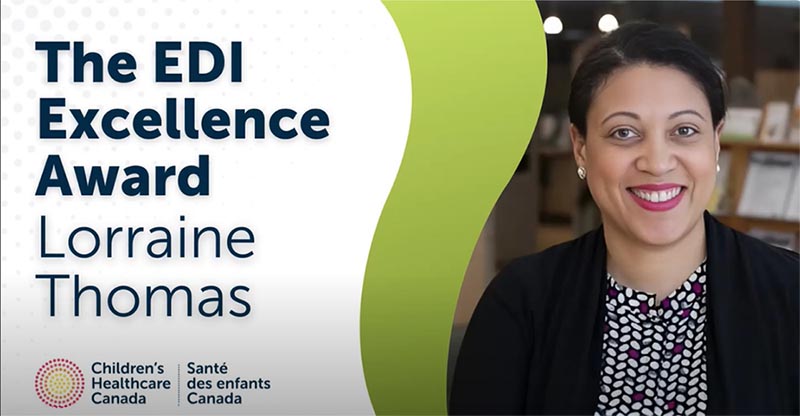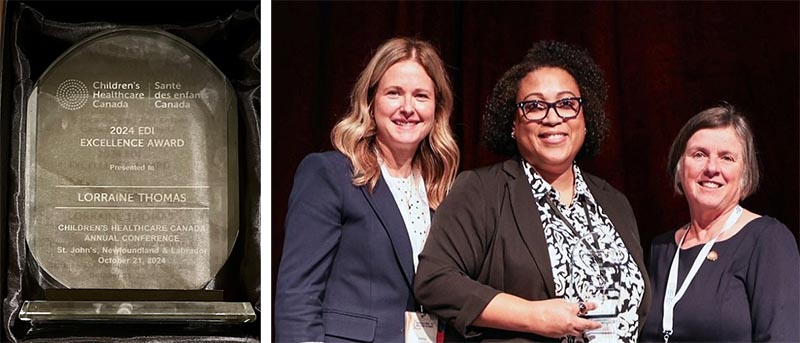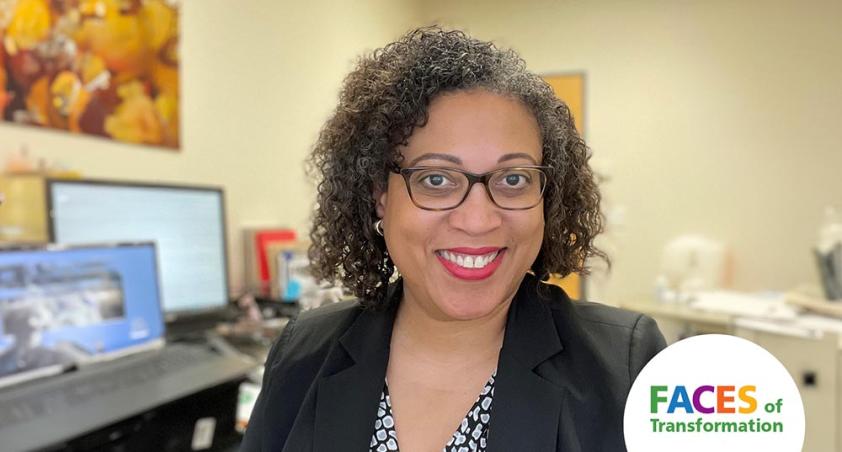Holland Blooview Kids Rehabilitation Hospital is committed to building an inclusive, diverse, equitable, accessible and ant-racist (IDEAA) environment that treats all individuals with respect and fairness. At the heart of this work is Lorraine Thomas, the manager of IDEAA. With over two decades at Holland Bloorview, Lorraine began her journey in therapeutic recreation before transitioning to her leadership role in the IDEAA office. Throughout her journey at Holland Bloorview, her passion for promoting diversity, equity, accessibility, and anti-racism has been unwavering.
Lorraine’s current work and the work of Holland Bloorview is centered around building and executing strategies that cultivate a healthy, equitable workplace for both staff and clients. Under her leadership, the IDEAA office is partnering with teams across the hospital to support an inclusive health care culture. This work includes one-on-one meetings with employees to identify opportunities for better support for staff and families; conducting individual and team-based consults to support IDEAA knowledge and capacity building as a reliable subject matter expert, liaison, and facilitator around social, racial and disability justice issue; and co-creating and/or updating policies and procedures that advance equity, belonging and anti-oppression at all levels of the organization.
Recently, Lorraine was honored with the prestigious 2024 Innovation and Impact award for EDI Excellence by Children’s Healthcare Canada (CHC). This award recognizes an individual, team, network, or organization that has demonstrated exceptional commitment and leadership in advancing equity, diversity, and inclusion within the health care sector for children and youth.

Lorraine received this award for her advocacy efforts to ensure that the care provided at Holland Bloorview is inclusive and reflective of the diverse communities we serve. Her contributions have had transformative effects on health care delivery for marginalized populations and on the workplace culture at Holland Bloorview.

“I am deeply honoured to receive this award. It is a testament to the ongoing work of colleagues past and present who continue to set the standards for health equity across the system, reflects Lorrainne. “Building an inclusive, equitable, and accessible health care environment requires focusing on both the givers and receivers of care. Education and awareness, embracing an anti-oppression lens, using data to identify client inequity, and ensuring that all can access health information and act on it, are just a few of the many actions we can take to accomplish this goal.”
“Congratulations to Lorraine for this well-deserved recognition. Her innovative and passionate leadership has significantly advanced equity, diversity, and inclusion at Holland Bloorview. Her vision and actions have cultivated a more inclusive, respectful, and supportive environment for our staff and for our clients and families, embedding IDEAA principles deeply into the hospital's culture and setting a powerful example for the health care system,” saidJoanne Maxwell, vice president, experience, transformation and social accountability at Holland Bloorview
Learn more about Lorraine:
Can you tell us a bit about yourself and your primary role at Holland Bloorview?
I have been advocating for community health, and client and family programs focused on unity, health literacy, and inclusion for under-serviced populations through out my career. As the manager, inclusion, diversity, equity, accessibility, and anti-racism (IDEAA), at Holland Bloorview, I am responsible for the development of authentic and responsive strategies to promote a healthy and equitable workplace.
How did you end up working at Holland Bloorview and what keeps you inspired to continue working at HB?
I began my journey at Holland Bloorview twenty-two years ago in therapeutic recreation, coordinating programs in multi-sensory environments (MSEs) or Snoezelen rooms. Later, as a family support specialist in the client and family integrated care team, I provided education and resources to families across the pediatric lifespan. I also served as the health literacy lead for over a decade, developing an organizational framework to create accessible plain language documents for clients and families, with input from trained family and youth reviewers through the hospital’s family leadership program. This role led me to join the planning committee for the 2017 health literacy symposium, co-sponsored by the Ministry of Health and Long-Term Care, the University Health Network, and the Canadian Health Literacy Patient Engagement Network.
From the beginning, I have applied a diversity, equity, and inclusion lens to my work. In each role, I have focused on improving how we communicate with and engage families and clients, and the importance of providing accessible health information.
Understanding cultural context within personal and professional relationships and how individuals express themselves, has always fascinated me.
As a hard-of-hearing/deaf person, I bring a unique perspective on communication and the framing of disability and ableism in healthcare. Originally from Trinidad, I also navigate the healthcare space as a racialized woman with an immigrant background.
One of my identities is as a hard-of-hearing/deaf person, so there is the aspect of communication from a sensory perspective and the framing of disability and ableism in health care and health care leadership. I’m originally from Trinidad, so had the immigrant experience of being a racialized woman navigating the health care space.
The IDEAA role allows me to integrate all those professional experiences towards creating a holistic and compassionate lens that will enable a healthy team and support the evolution of socially accountable care, as outlined in our strategic plan HB2030.
As the manager of the IDEAA office, what does a typical day look like for you?
On a given day I can wear many different hats. In many instances, IDEAA work requires a change management strategy. This necessitates a 360-degree approach to understanding how the actions we take affect all groups, given that IDEAA work by subject matter can also be emotional.
For example, I could be providing consultation about a new program, having a one-on-one dialogue with a colleague, chairing meetings for the three sub-committee meetings for the IDEAA task force which include education, data action and accessibility, and participating in meetings with external system partners where we’re actively collaborating and sharing information on how to create a more equitable healthcare experience for all.
In what ways have you seen the IDEAA office evolve since you began your role?
When I started my role in July 2022, anti-Indigenous and anti-Black racism were identified by Ontario Health as two populations requiring a specialized focus. We’ve also come to better understand that some groups are racialized based on intersecting factors such as religion, caste, or citizenship; and groups that might not be immediately identified in the IDEAA space are also subject to both faith-based and racialized discrimination. For added context, when the IDEAA office was first established seven years ago, it was called equity, diversity, and inclusion (EDI). Over the years, we acknowledged that intersectionality needed to automatically be part of the conversation, so we integrated disability inclusion and anti-racism into the title.
What are some of the IDEAA office responsibilities?
Currently the key priorities are focused on five areas:
- Staff education: Level-up internal knowledge, skills and capacity related to IDEAA through anti-racism education
- Employee well-being: Invest in employee wellness, belonging, and psychological safety through amplification of our discrimination, racism and harassment reporting process, employee resource groups, using socio-demographic data to create actions to align staff representation to the communities we serve and access to workplace mobility.
- Application of a social accountability lens: Apply IDEAA principles for inclusive service design through team consultation and IDEAA office representation on hospital committees.
- Implementing and utilizing data collection: Identifying underserved client and family populations with better precision through our social needs screening and client and family sociodemographic survey.
- Strengthen system partnerships: Ongoing partnership and best practices sharing with healthcare system partners and community groups, with a focus on health equity, Indigenous health and anti-Black racism.
Can you discuss any upcoming projects or goals for the IDEAA office in the near future?
We want to ensure that all equity-seeking groups at our hospital see themselves in our IDEAA priorities, which include continued engagement around the Roadmap to confront anti-Black racism at Holland Bloorview, integration of the two-eyed seeing model for Indigenous families and clients, and supporting the development of current and new employee resource groups, including the LGBTQ2S+, Jewish and Black employee groups.
What is your vision for the future of the IDEAA office, and how do you see its role evolving within Holland Bloorview and the broader community?
Over the years, there has been increasing diversity of Holland Bloorview families, which includes newcomers, many from areas that have experienced conflict. There is an opportunity to intentionally and strategically expand IDEAA principles even further to incorporate a broader understanding of providing trauma-informed care to provide a more holistic and mindful model of care for our families and clients.
